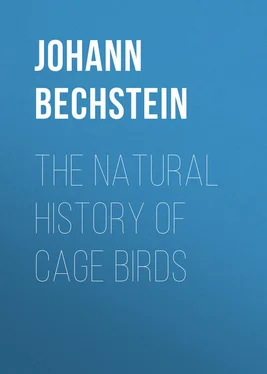Johann Bechstein - The Natural History of Cage Birds
Здесь есть возможность читать онлайн «Johann Bechstein - The Natural History of Cage Birds» — ознакомительный отрывок электронной книги совершенно бесплатно, а после прочтения отрывка купить полную версию. В некоторых случаях можно слушать аудио, скачать через торрент в формате fb2 и присутствует краткое содержание. ISBN: , Жанр: foreign_antique, foreign_prose, на английском языке. Описание произведения, (предисловие) а так же отзывы посетителей доступны на портале библиотеки ЛибКат.
- Название:The Natural History of Cage Birds
- Автор:
- Жанр:
- Год:неизвестен
- ISBN:http://www.gutenberg.org/ebooks/40055
- Рейтинг книги:4 / 5. Голосов: 1
-
Избранное:Добавить в избранное
- Отзывы:
-
Ваша оценка:
- 80
- 1
- 2
- 3
- 4
- 5
The Natural History of Cage Birds: краткое содержание, описание и аннотация
Предлагаем к чтению аннотацию, описание, краткое содержание или предисловие (зависит от того, что написал сам автор книги «The Natural History of Cage Birds»). Если вы не нашли необходимую информацию о книге — напишите в комментариях, мы постараемся отыскать её.
The Natural History of Cage Birds — читать онлайн ознакомительный отрывок
Ниже представлен текст книги, разбитый по страницам. Система сохранения места последней прочитанной страницы, позволяет с удобством читать онлайн бесплатно книгу «The Natural History of Cage Birds», без необходимости каждый раз заново искать на чём Вы остановились. Поставьте закладку, и сможете в любой момент перейти на страницу, на которой закончили чтение.
Интервал:
Закладка:
The first thing was to leave off hemp-seed entirely, confining them solely to rape-seed; but giving them at the same time abundance of bread, soaked in pure water, and then pressed; lettuce, endive, or water-cresses, according to the seasons, twice a week, giving them boiled bread and milk, about the size of a nutmeg. This is made by throwing a piece of the crumb of white bread, about the size of a nut, into a teacupful of milk, boiling it, and stirring it all the time with a wooden spoon till it is of the consistency of pap. It must be quite cold before it is given to the birds, and must always be made fresh, for if sour it will prove injurious.
This paste, which they are very fond of, purges them sufficiently, and sensibly relieves them. In very violent attacks, nothing but this paste ought to be given for two or three days following, and this will soon give the desired relief.
When the disease is slight, or only begun, it is sufficient to give the bread and milk once in three or four days. When employed under similar circumstances, this treatment has cured several very valuable birds. It may not be useless here to renew the advice of always giving the birds an opportunity of bathing every day, by putting in their way a saucer, or any other small shallow bath, filled with water, which should never be too cold, and in winter always milk-warm.
One thing which is very injurious to the lungs of birds, and which too often occurs, is the fright occasioned by tormenting them, or by seizing them too suddenly; for the poor little things often rupture a blood-vessel in the breast while beating themselves about: a drop of blood in the beak is the sign, and a speedy death is the general consequence. If this do not happen, the breathing is not the less difficult and painful; and recovery is rare, at least without the greatest care and attention.
Birds which eat insects and worms, occasionally, by accident, swallow some extraneous substance, which, sticking in their throat, stops their respiration, and stifles them. The only remedy is to extract the foreign body, which requires much skill and dexterity.
When asthma is brought on by eating seeds which are too old, spoiled, or rancid, Dr. Handel recommends some drops of oxymel to be swallowed for eight days following. But the best way is to change the seed, and be sure there is none but good seed in the trough.
This is caused by giving unnatural food to the bird, which destroys the digestive power of its stomach. In this case it disgorges, ruffles its feathers, and does not arrange them, and becomes thin very fast. The best thing is to make it swallow a common spider, which purges it, and put a rusty nail into its water, which strengthens the intestines, giving it at the same time its proper and natural food. Green food, such as lettuce, endive, chickweed, and particularly water-cresses, is the safest remedy. A very great appetite is a sign of this disease. A siskin, that was dying of atrophy, had nothing but water-cresses for three days following, and on the fourth he sung.
This disorder may be known by the extreme thinness of the breast, the swelling of the lower part of the belly, the total loss of appetite, and similar symptoms. As a cure, Dr. Handel recommends the juice of the white turnip to be given to drink instead of water.
This disease may be discovered from the frequent unsuccessful endeavours of the bird to relieve itself. Aperients will be of use. If a spider does not produce the desired effect, anoint the vent of the bird with the head of a pin steeped in linseed oil; this sort of clyster generally succeeds; but if the disease attacks a bird which eats meal-worms, one of these, bruised in sweet oil and saffron, is the most certain remedy, and the bird will swallow it without the least hesitation. Boiled bread and milk is generally of great use.
This is a disease to which birds that have been caught recently are very subject, before they are accustomed to their new food. Most of these die of it: they continually void a white calcareous matter, which sticks to the feathers round the vent, and being very acrid causes inflammation in that part and in the intestines. Sometimes chalybeate water and the oil clyster produce good effects; but it is better, if possible, to procure for the bird its most natural food. Some people pull out the feathers from the tail and vent, and then rub these parts with fresh butter, but this is a very painful and cruel operation. They also mix the yolk of an egg boiled very hard with their food, but I have never found this succeed very well. If there be any hope of curing this disease it is by attacking it at the beginning, before inflammation is violent; boiled bread and milk, a great deal of lettuce, or any other similar green refreshing food, in general completely cures them.
In a case of chronic diarrhœa, which almost reduces the birds to skeletons, Dr. Handel prescribes chalybeate water mixed with a little milk for their drink, which, he says, is an easy and certain cure.
This is a disease with which some parrots are attacked. The best remedy is to make the birds drink a great deal of boiled milk, or even very fat broth; for their intestines, which are very much irritated, require something soothing to protect them from the acrid discharges, which, at the same time, must be corrected by healing food. Birds in this state generally do nothing but drink, therefore plenty of boiled milk should be given them, as it nourishes them, as well as acts medicinally, but should it appear to turn sour in the stomach it must, at least for some time, be discontinued.
This gland, which is on the rump, and contains the oil necessary for anointing the feathers, sometimes becomes hard and inflamed, and an abscess forms there. In this case the bird often pierces it itself, or it may be softened by applying fresh butter without any salt; but it is better to use an ointment made of white lead, litharge, wax, and olive oil, which may be had at any good chemist’s. The general method is to pierce or cut the hardened gland, in order to let out the matter, but if this operation removes the obstruction it also destroys the gland, and the bird will die in the next moulting, for want of oil to soften the feathers 12 12 This, though the common opinion, seems incorrect. See Rennie’s “Habits of Birds,” p. 4. – Translator.
.
The gland is known to be obstructed when the feathers which surround it are ruffled, the bird never ceasing to peck them, and instead of being yellow it becomes brown. This disease is very rare among wild birds, for, being exposed to damp, and bathing often, they make more use of the liquor in the gland, consequently it does not accumulate sufficiently to become corrupted, sour, or cancerous. This confirms the necessity of giving them the means of bathing as often as instinct would induce them, as nothing can be more favourable to their health.
Dr. Handel, after piercing the gland, recommends a little magnesia to be mixed with the bird’s drink.
This is a disease with which house birds are very often attacked. What I have found to be most useful in this case is to plunge the sick birds every now and then into very cold water, letting them fall suddenly into it, and cutting their claws, or at least one or two, short enough for the blood to run.
From bleeding giving so much relief one would think that this disease is a kind of apoplexy, occasioned by want of exercise and too much food. Bullfinches and thrushes are more subject to it than any other birds, and bleeding always cures them. I have seen this done with great success in the following manner, but much delicacy and skill are required, as there would be great danger of laming the bird: – a very small hole is made on the surface of the claw, with a lancet or very sharp penknife; it is then plunged in lukewarm water, and if the operation be well done the blood runs like a thread of red silk; when removed from the water the bleeding stops: no bandage or dressing is required.
Читать дальшеИнтервал:
Закладка:
Похожие книги на «The Natural History of Cage Birds»
Представляем Вашему вниманию похожие книги на «The Natural History of Cage Birds» списком для выбора. Мы отобрали схожую по названию и смыслу литературу в надежде предоставить читателям больше вариантов отыскать новые, интересные, ещё непрочитанные произведения.
Обсуждение, отзывы о книге «The Natural History of Cage Birds» и просто собственные мнения читателей. Оставьте ваши комментарии, напишите, что Вы думаете о произведении, его смысле или главных героях. Укажите что конкретно понравилось, а что нет, и почему Вы так считаете.












